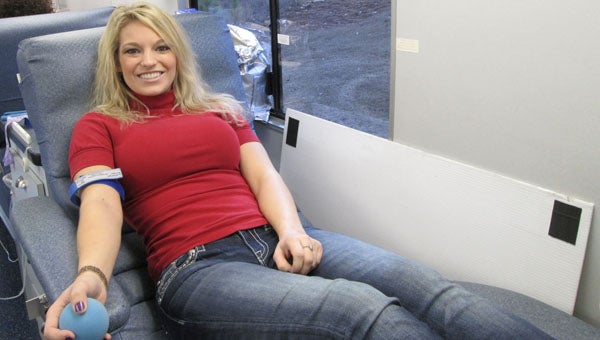Blood banks in need of donations
Published 9:30 am Tuesday, June 28, 2016

Amy Waloszyk of Greenville donated blood at a blood drive at LBW Community College. According to officials with LifeSouth Community Blood Centers, blood supply levels are low and blood banks across the state are in need of donations. (File Photo)
There is an urgent need for Alabamians to roll up their sleeves and donate.
According to officials with LifeSouth Community Blood Centers, blood supply levels are “quite low.” In fact, earlier this month, LifeSouth’s need for donations was at an emergency level meaning it had less than two days of blood in reserve to restock the hospitals it supplies.
“This happens regularly during the summer,” said Gary Kirkland, spokesman for LifeSouth. “School is out and high school blood drives play an important part in keeping the local blood supply fully stocked. Summer is also a time when many of our regular donors are traveling, and schedules get filled with many other activities. This year that annual shortage was more acute because many of our hospitals were facing a larger demand.”
Locally, LifeSouth provides blood to Georgiana Medical Center, Crenshaw Community Hospital, Jackson Hospital, Baptist East, Baptist South and Monroe County Hospital.
According to LifeSouth, more than 44,000 blood donations are needed every day to keep up with the demand, however, less than 10 percent of those eligible to donate do so.
“We need donors every day,” Kirkland said. “Blood has a shelf life, red blood cells are only good for 42 days after donation, platelets for only five, so we need donors to give regularly. Whole blood donations – what most people think of as a regular donation, can be done every 56 days, so giving twice during the summer gives us help when we need it the most. For those who’ve never donated, summer is the perfect time to start.”
To give blood one must be in good health, 17 years or older (or 16 with parental permission), weigh at least 110 pounds and show a valid photo I.D.
“What we need most is O-negative, the universal donor that can go to anyone in an emergency, and O-positive, that can go to anyone in need with a positive blood type, which is about 85 percent of us,” Kirkland said. “We also need platelet donors. Platelet donation takes longer, about two hours, and because platelets are more quickly replaced, donors can give every two weeks if they wish. Platelets are especially important for cancer patients and trauma patients.”
One donation — one pint of blood — can save up to three lives.
Kirkland said the tragic attack at an Orlando nightclub earlier this month was a reminder of how a donor can save a life in just 10 minutes time.
“The tragedy in Orlando raised the awareness on the importance of blood donation,” he said. “It was the donors who gave long before that tragedy, who were able to save lives that night, because the blood must be processed, tested and waiting at the hospital when an ambulance rolls in. Donors who give later helped resupply what was used.”
Each year, trauma accounts for approximately 41 million emergency department visits and 2.3 million hospital admissions in the U.S., according to the National Trauma Institute. A single car accident victim can need as many as 100 units of blood.
The Red Cross provides blood to approximately 2,600 hospitals nationwide, including more than 60 hospitals throughout the Alabama and Central Gulf Coast Blood Services Region.
“It’s the blood products on the shelves that helps save lives in an emergency,” said Mario Sedlock, director of donor recruitment of the Red Cross Alabama and Central Gulf Coast Blood Services Region. “When seconds matter, having a readily available blood supply is critical to trauma patient care.
“Type O-negative donors are an important part of the Red Cross trauma team. While all blood types are needed, type O-negative donations are necessary in emergency situations when there is no time to determine a patient’s blood type. Because there is such a high demand for type O-negative blood, O-negative donors are needed to donate often.”
Kirkland said the life one saves by donating may be a friend or family member.
“One patient in every seven entering a hospital will need blood,” he said. “Our LifeSouth donors help hospitals in our communities, so our donors are helping their friends, neighbors and family members when they donate with LifeSouth.”
LifeSouth will have a Bloodmobile at Greenville’s Walmart July 3 from 11 a.m. to 4 p.m. and July 7 from noon to 7 p.m.
Blood donations can be made to the Red Cross by scheduling an appointment by visiting redcrossblood.org or calling 1-800-RED CROSS (1-800-733-2767).





